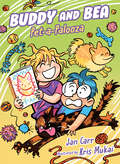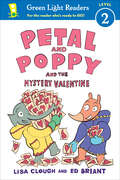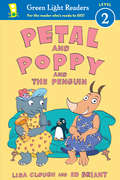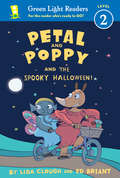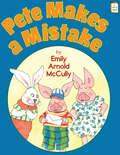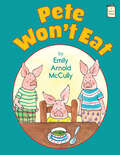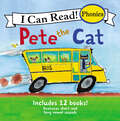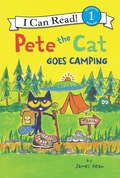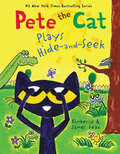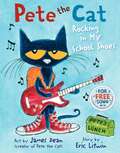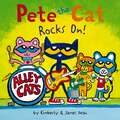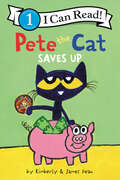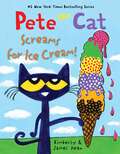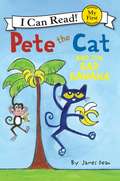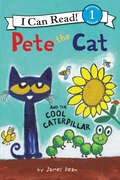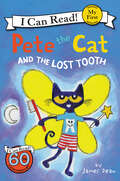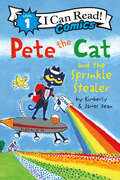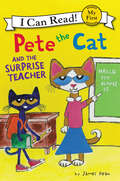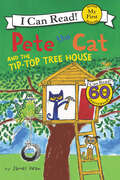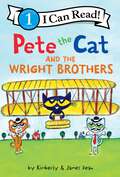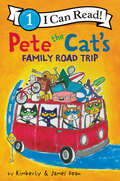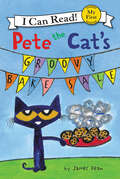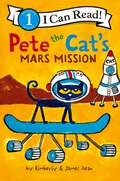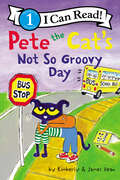- Table View
- List View
Pet-a-Palooza (Buddy and Bea #3)
by Jan CarrMeet the pets of Buddy and Bea and their friends in the third installment of this laugh-out-loud illustrated chapter book series celebrating life in a second grade classroom.After an author visits their classroom, Buddy and his friends are inspired to write about their pets—in fact, animals are suddenly all anyone can talk about! Joey&’s adorable puppy even stops by Ms. Maple&’s classroom (and makes a major mess). But something seems off about the things Bea is saying about her cat. Are her stories true?Buddy has his own pet problems (training a cranky cat is . . . hard), so he tries not to focus on the drama with Bea. But she isn&’t so easy to ignore. No one knows what to think about Bea&’s tales—should they believe her? Is she fibbing? The truth turns out to be more complicated than Buddy thought.
Petal and Poppy and the Mystery Valentine (Green Light Readers Level 2)
by Ed Briant Lisa CloughFriends Petal the elephant and Poppy the rhino team up to solve a Valentine&’s Day whodunit in this delightful adventure for young readers. On Valentine&’s Day morning, Petal wakes up to chocolates. Poppy wakes to find flowers. What wonderful gifts for these best friends to give each other. But wait . . . Poppy forgot to get Petal a gift, and Petal forgot to get something for Poppy. So who is this mystery Valentine? With picture clues and simple text, this charming book brings the warmth of Valentine&’s Day to burgeoning readers. &“Briant&’s graphic-novel style illustrations are a great match for emerging independent readers . . . The appealing, bright colors and simply drawn characters are just as sweet as the story.&”—Booklist
Petal and Poppy and the Penguin (Green Light Readers Level 2)
by Ed Briant Lisa CloughPetal and Poppy discover an uninvited visitor in their garden—a penguin! At first, Petal's too afraid to let him in. But eventually not even Petal can resist this cute, friendly, and very talented little guy! Petal and Poppy and the Penguin is the second Petal and Poppy book, told in graphic form. Word repetition, picture clues, and a simple plotline facilitate young readers in their development into lifelong lovers of reading.
Petal and Poppy and the Spooky Halloween! (Green Light Readers Level 2)
by Ed Briant Lisa CloughHalloween is here and Petal and Poppy are going to a party! But Petal's scared. Halloween is too spooky. But Poppy assures Petal it's all just pretend. There's nothing to be afraid of. But then a haunted house scares Poppy. Maybe Halloween is a little spooky after all! The writing level and picture clues will help early readers perfect their reading technique, while the wonderful story--with just the right amount of spookiness--will spark a love of reading that will last a lifetime.
Pete Makes a Mistake (I Like to Read)
by Emily Arnold McCullyIn this charming easy-to-read companion to Pete Won't Eat, which earned starred reviews from Kirkus Reviews and School Library Journal, Pete's sister Rose is having a party. She promises Pete some cake if he will deliver invitations to her friends Nell, Don and Gert. What a good deal for Pete! Pete brings Nell and Don their notes, but he gets distracted and forgets all about Gert. On the day of the party, Pete's mistake causes many hurt feelings. Can Pete save the party -- and will he still get cake? An I Like to Read® book. Guided Reading Level E.
Pete Won't Eat (I Like to Read)
by Emily Arnold McCullyEveryone is mad at Pete! Even Mom! But Pete can't eat that green slop that Mom made for lunch. He won't even taste it! His siblings want Pete to eat so they can go out to play. But Pete stands firm, and his siblings desert him. Mom makes Pete stay, but she is feeling sad about it. She is about to make him a sandwich when Pete decides to try the slop. He likes it! In addition to enjoying the yummy slop, Pete has learned the benefits of keeping an open mind and trying new things.
Pete and Jem: A Grammar Tales Book to Support Grammar and Language Development in Children (Grammar Tales)
by Jessica HabibPete and Jem are having lots of fun playing in the snow until they run into each other and fall over. Targeting Subject-Verb sentences and present progressive verbs, this book provides repeated examples of early developing syntax and morphology which will engage and excite the reader while building pre-literacy skills and make learning fun, as well as exposing children to multiple models of the target grammar form. Perfect for a speech and language therapy session, this book is an ideal starting point for targeting client goals and can also be enjoyed at school or home to reinforce what has been taught in the therapy session.
Pete the Cat 12-Book Phonics Fun! (My First I Can Read)
by Kimberly Dean James DeanPete the Cat helps kids learn to read with phonics! Who knew reading could be so groovy?This set of 12 simple and fun Pete the Cat storybooks is an excellent choice to share with your beginning reader. It’s a fun way to learn to read and as a supplement for activity books for children ages 3 to 6. Enter into the world of reading with My First I Can Read! Reviewed by a phonics expert, these 12 short full-color books feature repeated examples of short and long vowel sounds and common sight words. Each of the simple stories in this box set is designed to teach kids how to master reading while rocking out with Pete the Cat.Phonics teaches children the relationship between letters and the sounds they make. A child who has mastered these relationships has an excellent foundation for learning to read and spell. According to the National Institute of Child Health & Human Development, a child who has learned phonics has a method to recognize familiar words and “decode” unfamiliar ones.
Pete the Cat Goes Camping (I Can Read Level 1)
by Kimberly Dean James DeanNew York Times bestselling author and artist James Dean takes readers along for an outdoor adventure with Pete the Cat!In Pete the Cat Goes Camping, Pete can't wait to go hiking, fishing, and eat s'mores by the campfire. But when he hears about the mysterious creature named Bigfoot, Pete can't help but wonder: Is Bigfoot real?Kids love exploring the outdoors, and they're sure to enjoy this funny story about Pete the Cat going camping for the first time (and overcoming his small fears).Pete the Cat Goes Camping is a Level One I Can Read book, which means it’s perfect for children learning to sound out words and sentences. Whether shared at home or in a classroom, the short sentences, familiar words, and simple concepts of Level One books support success for children eager to start reading on their own.
Pete the Cat Plays Hide-and-Seek (Pete the Cat)
by Kimberly Dean James DeanPete the Cat loves to play hide-and-seek! When his friends hide, Pete covers his eyes and counts to 10. He opens them and just knows he will find them soon.But finding his friends may be harder than Pete thought. Are they behind a tree or on a bus? Or will Pete give up?Find out how Pete learns to chill out in this cool story full of surprises at every peek!From the authors of the #1 New York Times bestselling Pete the Cat series, James and Kimberly Dean, this picture book is reminiscent of Pete favorites like Magic Sunglasses and perfect for fans of Grumpy Monkey by Suzanne Lang.Don't miss Pete's other adventures, including Pete the Cat: I Love My White Shoes, Pete the Cat: Rocking in My School Shoes, Pete the Cat and His Four Groovy Buttons, Pete the Cat Saves Christmas, Pete the Cat and His Magic Sunglasses, Pete the Cat and the Bedtime Blues, Pete the Cat and the New Guy, Pete the Cat and the Cool Cat Boogie, Pete the Cat and the Missing Cupcakes, and Pete the Cat and the Perfect Pizza Party, Pete the Cat: Crayons Rock!, and Pete the Cat’s Groovy Imagination.
Pete the Cat Rocking in My School Shoes: A Back To School Book For Kids (Pete The Cat Ser.)
by Eric LitwinPete the cat wears his school shoes while visiting the library, the lunchroom, the playground, and more while singing his special song.
Pete the Cat Rocks On! (Pete the Cat)
by Kimberly Dean James DeanRock on with Pete the Cat in this groovy storybook about keeping calm and rocking on by New York Times bestselling author-illustrator team Kimberly and James Dean. Includes over thirty stickers!Pete the Cat can’t wait to rock out at the Alley Cats concert! But when the band never comes onstage, it’s up to Pete to find them. Will Pete have the right instruments to help the Alley Cats save the show? Find out in this rockin’ story full of problem-solving and friendship! Includes over thirty awesome stickers.
Pete the Cat Saves Up (I Can Read Level 1)
by Kimberly Dean James DeanPete the Cat earns and saves money to buy a supercool toy in this Level 1 I Can Read from New York Times bestselling creators Kimberly and James Dean.Pete the Cat wants a supercool Sharkbot toy, but he doesn’t have enough money in his piggy bank. He takes on odd jobs, from shoveling snow to selling lemonade and more, and saves every penny. How long will it take for him to earn enough money to buy the toy? Find out in this Level 1 I Can Read book complete with original illustrations from the creators of Pete the Cat, Kimberly and James Dean. Pete the Cat Saves Up is perfect for children learning to sound out words and sentences. Whether shared at home or in a classroom, the short sentences, familiar words, and simple concepts of Level One books support success for children eager to start reading on their own.
Pete the Cat Screams for Ice Cream! (Pete the Cat)
by Kimberly Dean James DeanI scream! You scream! Pete screams for ice cream! <P><P> The Just Chillin’ ice cream truck is coming today and Pete the Cat can't wait. He runs as fast as he can to find the truck. It's getting late, but his friends need his help. <P><P> Will Pete take a little time out of his day to help his friends? <P><P> Follow Pete the Cat as he learns that it's always cool to be kind. <P><P> From the authors of the #1 New York Times bestselling Pete the Cat series, James and Kimberly Dean, this picture book is reminiscent of Pete favorites like Magic Sunglasses and perfect for fans of Grumpy Monkey by Suzanne Lang. <P><P><i>Advisory: Bookshare has learned that this book offers only partial accessibility. We have kept it in the collection because it is useful for some of our members. Benetech is actively working on projects to improve accessibility issues such as these.</i> <p> <b>New York Times Bestseller</b>
Pete the Cat and the Bad Banana (My First I Can Read)
by Kimberly Dean James DeanNew York Times bestselling author and artist James Dean brings readers along for a hilarious ride with Pete the Cat!Pete the Cat bites into a bad banana and decides that he never, ever wants to eat another banana again. But Pete really likes bananas! Will a rotten bite ruin Pete's love for this tasty fruit?Pete the Cat and the Bad Banana is a My First I Can Read book, which means it's perfect for shared reading with a child.
Pete the Cat and the Cool Caterpillar (I Can Read Level 1)
by Kimberly Dean James DeanPete the Cat meets a super-cool caterpillar in the first Pete the Cat Level 1 I Can Read tale from New York Times bestselling author-illustrator James Dean.Pete thinks he found a new best friend. But when his caterpillar goes missing, Pete has to find out what happened to his new friend. Pete is in for one wild surprise at the end!Pete the Cat and the Cool Caterpillar is a Level I Can Read book, complete with original illustrations from the creator of Pete the Cat, James Dean, and is perfect for children learning to sound out words and sentences. Whether shared at home or in a classroom, the short sentences, familiar words, and simple concepts of Level One books support success for children eager to start reading on their own.
Pete the Cat and the Lost Tooth (My First I Can Read)
by Kimberly Dean James DeanNew York Times bestselling author and artist James Dean brings readers along for a fun and surprising adventure with Pete the Cat!In Pete the Cat and the Lost Tooth, the tooth fairy asks Pete for some help. But it’s not easy being the tooth fairy for Pete when a tooth goes missing—will he be able to find the lost tooth before it’s too late?Beginning readers will love Pete's adventure as the tooth fairy in this My First I Can Read story, complete with original illustrations from the creator of Pete the Cat, James Dean. My First I Can Read books are perfect for shared reading with a child.
Pete the Cat and the Sprinkle Stealer (I Can Read Comics Level 1)
by Kimberly Dean James DeanFrom New York Times bestselling author-illustrator team James and Kimberly Dean comes the next I Can Read Comics book in the Pete the Cat series! In Pete the Cat and the Sprinkle Stealer, Secret Agent Meow (also known as Pete the Cat) is ready to crack another case: a cat burglary hits too close to home when someone steals Pete’s parents’ secret recipe for rainbow sprinkle cookies!Pete the Cat and the Sprinkle Stealer is a Level One I Can Read Comic, which means it will introduce children into the world of graphic novel storytelling and encourage visual literacy in emerging readers.
Pete the Cat and the Surprise Teacher (My First I Can Read)
by Kimberly Dean James DeanEveryone, even teachers, can learn something new at school in this Pete the Cat I Can Read adventure from New York Times bestselling author-illustrator, James Dean.When Pete goes to school, he finds out his teacher is out sick and the substitute teacher is . . . his mom! It’s up to Pete to teach the teacher what school is all about. Beginning readers will enjoy this story about Pete and his mom working together to make the most awesome teaching team ever!Pete the Cat and the Surprise Teacher is a My First I Can Read book, which means it’s perfect for shared reading with a child.
Pete the Cat and the Tip-Top Tree House (My First I Can Read)
by Kimberly Dean James DeanNew York Times bestselling author and artist James Dean takes readers along for a fun, groovy adventure with Pete the Cat!In Pete the Cat and the Tip-Top Tree House, Pete invites all of his friends over to spend time in his tree house. When they climb up, they realize the tree house is not big enough to fit everyone! They all work together to build the coolest tree house ever.Beginning readers will love the adventures of Pete and his friends in this My First I Can Read story, complete with original illustrations from the creator of Pete the Cat, James Dean. My First I Can Read books are perfect for shared reading with a child.
Pete the Cat and the Wright Brothers (I Can Read Level 1)
by Kimberly Dean James DeanPete the Cat helps the Wright brothers build their first flying machine in this historical fiction Level 1 I Can Read from New York Times bestselling creators Kimberly and James Dean. When Pete the Cat learns that the Wright brothers' flying machine can’t fly without the wind, he has an idea. What if it didn’t need wind to fly? Together, the cats invent the perfect solution. Pete may even get the chance to fly! This early reader includes an author’s note about the real life Wright brothers and the true story of the first flight. Find out in this Level 1 I Can Read book complete with original illustrations from the creators of Pete the Cat, Kimberly and James Dean. Pete the Cat and the Wright Brothers is perfect for children learning to sound out words and sentences. Whether shared at home or in a classroom, the short sentences, familiar words, and simple concepts of Level One books support success for children eager to start reading on their own.
Pete the Cat's Family Road Trip (I Can Read Level 1)
by Kimberly Dean James DeanPete the Cat and his family go on a cross-country adventure in this Level 1 I Can Read tale from New York Times bestselling creators Kimberly and James Dean! Pete the Cat and his family are ready explore all the many wonderful American landmarks on their fun family road trip! They visit many famous sights, including Niagara Falls, New Orleans, Savannah, and more.Of course, no true road trip is complete without a flat tire! But the Cat family isn't going to let a small setback get in the way of fun...Pete the Cat's Family Road Trip is a Level I Can Read book, complete with original illustrations from the creators of Pete the Cat, Kimberly and James Dean, and is perfect for children learning to sound out words and sentences. Whether shared at home or in a classroom, the short sentences, familiar words, and simple concepts of Level One books support success for children eager to start reading on their own.
Pete the Cat's Groovy Bake Sale (My First I Can Read)
by Kimberly Dean James DeanPete the Cat whips up something extra cool in the next Pete the Cat My First I Can Read tale from New York Times bestselling author-illustrator James Dean!The school's bake sale is a day away! Pete tries to make something yummy for his friends. But he seems to be only making a giant mess! Will Pete have something delicious in time for the bake sale? Beginning readers will love Pete's adventure in the kitchen in this My First I Can Read story, complete with original illustrations from the creator of Pete the Cat, James Dean. My First I Can Read books are perfect for shared reading with a child.
Pete the Cat's Mars Mission (I Can Read Level 1)
by Kimberly Dean James DeanPete the Cat travels to Mars to help his friend in this Level 1 I Can Read from New York Times bestselling creators Kimberly and James Dean. Marty is stuck on Mars, and it’s up to Pete the Cat to rescue him! Will Pete have the tools he needs to get Marty home?Find out in this Level 1 I Can Read book complete with original illustrations from the creators of Pete the Cat, Kimberly and James Dean. Pete the Cat's Mars Mission is perfect for children learning to sound out words and sentences. Whether shared at home or in a classroom, the short sentences, familiar words, and simple concepts of Level One books support success for children eager to start reading on their own.
Pete the Cat's Not So Groovy Day (I Can Read Level 1)
by Kimberly Dean James DeanPete the Cat searches for the bright spots during a not so groovy day in this Level 1 I Can Read from New York Times bestselling creators Kimberly and James Dean!Pete the Cat is having a bad day: his best shirt is dirty, he left his crayons at home, and he’s late for school. What will it take for Pete to turn his not so groovy day into a cool one after all?Find out in this Level I Can Read book complete with original illustrations from the creators of Pete the Cat, Kimberly and James Dean. Pete the Cat’s Not So Groovy Day is perfect for children learning to sound out words and sentences. Whether shared at home or in a classroom, the short sentences, familiar words, and simple concepts of Level One books support success for children eager to start reading on their own.
